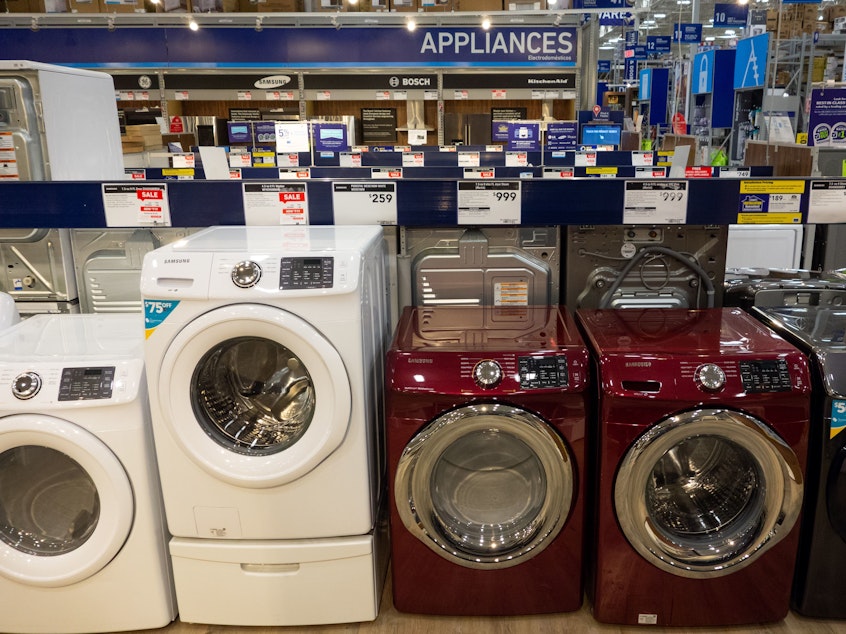Tariffs' Complex Ripple Effects Hit Appliance Shoppers And Makers

It was a daunting task. Amid a major renovation, Jani Mussetter needed a lot of appliances: a washer, dryer, refrigerator, freezer, dishwasher and stove. As she visited showrooms in January, a stressful thing kept coming up: warnings of a price increase on Feb. 1.
For Mussetter, shopping for higher end appliances, that potentially meant paying hundreds of dollars more. And why? "They said, because of all the tariffs," the San Francisco resident says.
Tariffs and the trade war have been in the news for more than a year, since President Trump began imposing higher taxes on various imported products and materials.
For regular American shoppers, major household appliances perfectly illustrate the complicated reality of the trade dispute. One tariff was a boon to some domestic manufacturers. But other tariffs hiked costs for the entire industry worldwide. Prices on appliances are now slowly recovering from their biggest increase in about five years.
Whirlpool's gamble
Sponsored
Whirlpool, a leading American appliance maker, is at the heart of the issue. Its prices had barely changed for many years, says G.research housing analyst Alvaro Lacayo. Then, in 2018, he says, "you saw a big tick upward."
At first, higher prices were welcome news for Whirlpool. They reflected the company's victory over its two main foreign competitors, South Korea's LG and Samsung.
Whirlpool — which also own Maytag, Jenn-Air and other brands — had spent years arguing that LG and Samsung had been "dumping appliances into the U.S. market at below cost, rendering competition irrational," as Lacayo put it.
In January 2018, President Trump agreed with Whirlpool. He set a new tariff, or tax, on imported washing machines, starting at 20 percent. So, selling washers to Americans became more expensive for foreign companies. And domestic manufacturers like Whirlpool could finally raise prices.
But then, Trump imposed more tariffs, on metals including aluminum and steel. Steel, in particular, is critical to building almost any appliance.
Sponsored
Suddenly, appliance makers everywhere, including Whirlpool, began complaining about the rising cost of raw materials. They had little choice but to start raising their own prices.
"Global steel costs have risen substantially and, particularly in the U.S., they have reached unexplainable levels," Whirlpool CEO Marc Bitzer said during an analyst call in July 2018.
What happens next
Steve Sheinkopf owns Yale Appliance & Lighting in the Boston area, and he's a third-generation owner. "We have been here for almost 100 years now, it's hard to believe," he says.
Many brands Sheinkopf works with — like Wisconsin-based Sub-Zero and Wolf or Germany's Thermador — regularly inch up their prices, he says, but the increases in the past year have been bigger than most.
Sponsored
Sheinkopf predicts that appliance prices are probably stabilized at this point, at least for a while. But for shoppers who chase sales and specials, he says, promotions haven't been as good as they used to be three to four years ago.
Overall, prices of major appliances tracked by the consumer price index are starting to tick down month-to-month. But they are still higher than they were last year.
"On certain products, you could be looking at a 14- to 16-percent increase from last year to this year," Sheinkopf says. "When you talk about [washing] machines that people want to buy, front-loaders, I think you're looking at $200 to $400 difference versus last year."
Many companies stretched some of the price increases into early 2019, still citing high costs of raw materials as well as changes in the currency market and labor costs. That's what Mussetter experienced as she rushed to buy appliances for her remodel before Feb. 1.
"I'd be really bummed if I was walking in today," she says with a laugh. Mussetter did manage to buy all her appliances ahead of the price jump. Later, she learned this saved her $1,250.
Sponsored
And one other thing happened last year, Whirlpool's Korean competitors, LG and Samsung, fast-tracked new manufacturing plants — in America. It's great news for American jobs. But for Whirlpool?
"I think this is the biggest challenge they'll ever have," Sheinkopf says. [Copyright 2019 NPR]

